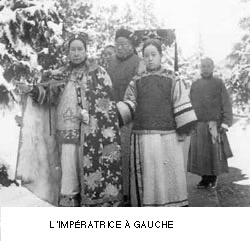 For thirty centuries, China had remained impenetrable to any civilization other than its own; it was beyond all incontestably superior to that of all the peoples around it, including Japan as well as the peoples of India. No wonder China was the center of the universe. Without the stimulus of cultural exchange and commercial competition, the Chinese could only stagnate and in the 19th century they kept a technical level similar to that of Europeans five centuries earlier. Episodic relations with the Europeans could not teach anything to the subjects of the Middle Empire, who affected a disdainful superiority vis-à-vis the "barbarians".
For thirty centuries, China had remained impenetrable to any civilization other than its own; it was beyond all incontestably superior to that of all the peoples around it, including Japan as well as the peoples of India. No wonder China was the center of the universe. Without the stimulus of cultural exchange and commercial competition, the Chinese could only stagnate and in the 19th century they kept a technical level similar to that of Europeans five centuries earlier. Episodic relations with the Europeans could not teach anything to the subjects of the Middle Empire, who affected a disdainful superiority vis-à-vis the "barbarians".
As much as the diversity of customs, the coarseness of the men with whom they made contact, had maintained among the Chinese this contempt for the undeniable technical superiority of the Westerners and had confirmed them in the certainty of the superior value of their culture. They only affirmed, like the men of Antiquity, that they knew how to distinguish technical progress and civilization. The Chinese experienced their first disappointment during the so-called Opium War.
Emperor Tao Kuang having banned the importation of this drug (the abuse of this narcotic seriously endangered the health of millions of Chinese), the English, who were the main exporters, wanted to defend their privileges, arms in hand. That there can be justified wars there is for sure, but this was one of the most insane; the Chinese, while having for them the strictest right, were swept away by the cannon shots of the English and were not only constrained with the Status quo ante but also to open their ports to the trade of the Europeans, without speaking about the cession of Hong Kong Island. This first conflict between the civilization of the East and that of the West was truly edifying.
The Chinese suddenly realized that their weapons were only toys compared to those of Europeans, and they tried to ward off the most urgent by organizing in the west some detachments of their army. Ready to collapse, the Manchu Empire was at the extreme limit of resistance. According to Chinese tradition, the founder of a dynasty ruled by divine right and therefore possessed virtue par excellence by becoming in Son of Heaven. Besides, this virtue tends to weaken among hereditary successors and, in the end, effective power escapes the emperor who is kept under the thumb of the women of the Court and of ministers? This is how the dynasty dies. It was precisely at this point that China was at the end of the 19th century. 
When Hien-Foung died, power practically passed to one of his wives, Ts 'eu-Hi, mother of the new emperor T'oung-Tche; she was a very energetic, unscrupulous woman, who was often cruel. Ts’eu-Hi knew how to maintain an undeniable position of superiority.
Coming from an old Manchu family, she had grown up in court and was imbued with many prejudices. While the Opium War was a salutary lesson, inviting Chinese officials to at least learn about the power of their Western opponents, they nevertheless retained their almost unaltered presumption in the face of trade expansion. Europeans. Japan had understood in time that a state of feudal structure, technically behind by several centuries, was like a pot of earth amidst pots of iron. Also, very quickly, by sending observers to Europe and America, he had been able to catch up on Western civilization. Logic meant that this state, whose demographic growth was accelerating with progressive industrialization, would look towards the Continent as towards a land of easy conquest. It was inevitable that Japan, when attempting its first expansion adventure in Korea, would come up against resistance from China. But the armies of the Emperor Kouang-Siu (who had succeeded his cousin T'oung-Tche at the age of four) or, better said, the armed forces of his terrible tutor, melted like snow in the sun under Japanese artillery fire. The Shimonoseki Treaty (1895) ratified the Chinese disaster.
Logic meant that this state, whose demographic growth was accelerating with progressive industrialization, would look towards the Continent as towards a land of easy conquest. It was inevitable that Japan, when attempting its first expansion adventure in Korea, would come up against resistance from China. But the armies of the Emperor Kouang-Siu (who had succeeded his cousin T'oung-Tche at the age of four) or, better said, the armed forces of his terrible tutor, melted like snow in the sun under Japanese artillery fire. The Shimonoseki Treaty (1895) ratified the Chinese disaster.  Shortly after, xenophobia advised the old empress to favor the activities of one of the many societies secret then swarming in China, the Hi-cho-chuan, later known in Europe as the Boxers.
Shortly after, xenophobia advised the old empress to favor the activities of one of the many societies secret then swarming in China, the Hi-cho-chuan, later known in Europe as the Boxers.
In the spring of 1900, the revolt broke out. It results in a dreadful massacre of whites and Chinese Christians.
Tien-Tsin's legations fiercely defend themselves against the rioters who attack them. An Anglo-Franco-Italian-German expeditionary force restores order by occupying Beijing .So the Empress, forced to flee, understands the value of reforms. Late, they will not save China from the final collapse.
PIYIN WRITING
Kuang-Siu (Guangxu) 1871/1908
T'seu- Hi (Cixi) 1835/1908
Hien-foung(Xianfeng)1831/1861
Toung-Tche (tongzhi) 1856/1875
Posted By:Lidis editions / confalonieri
